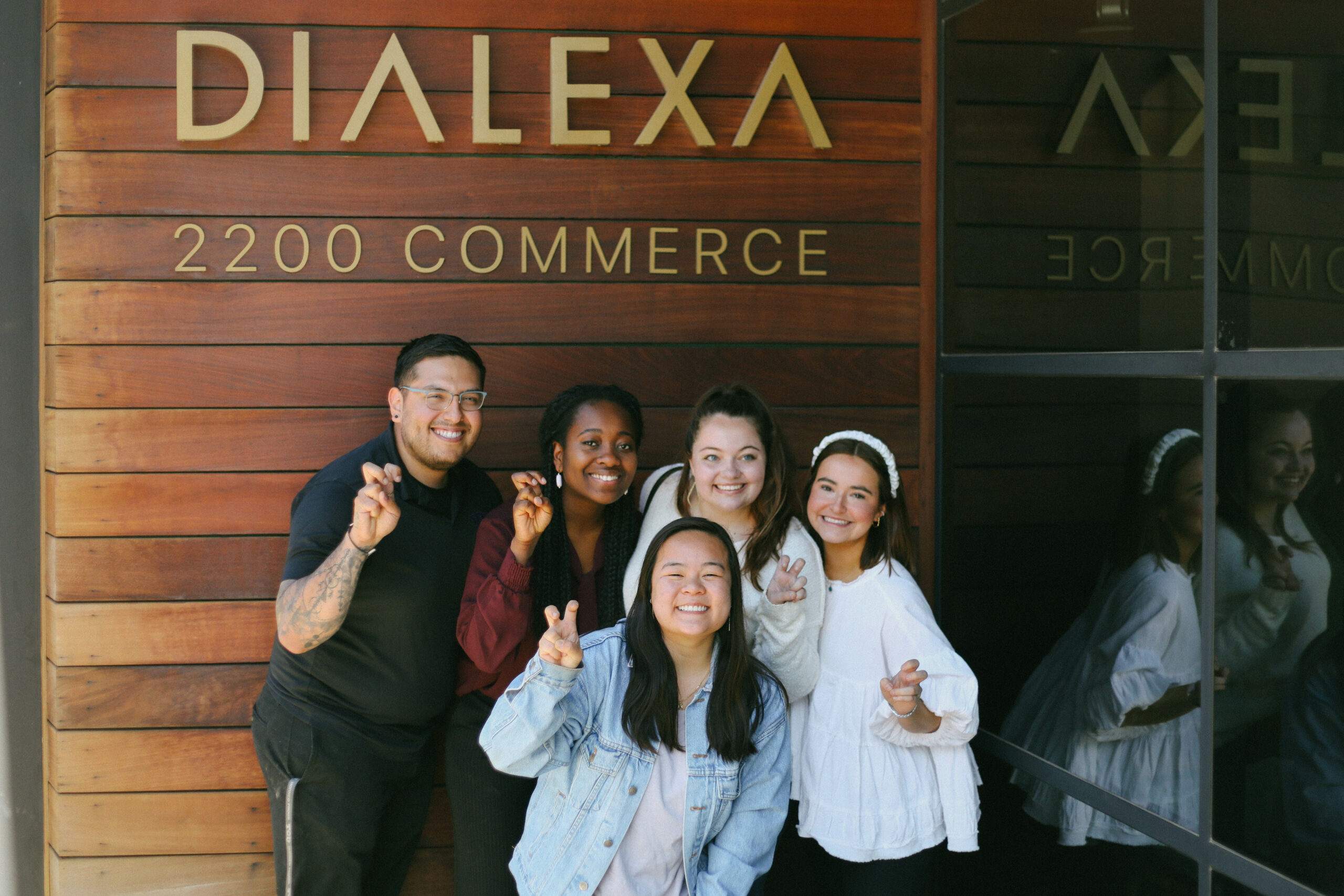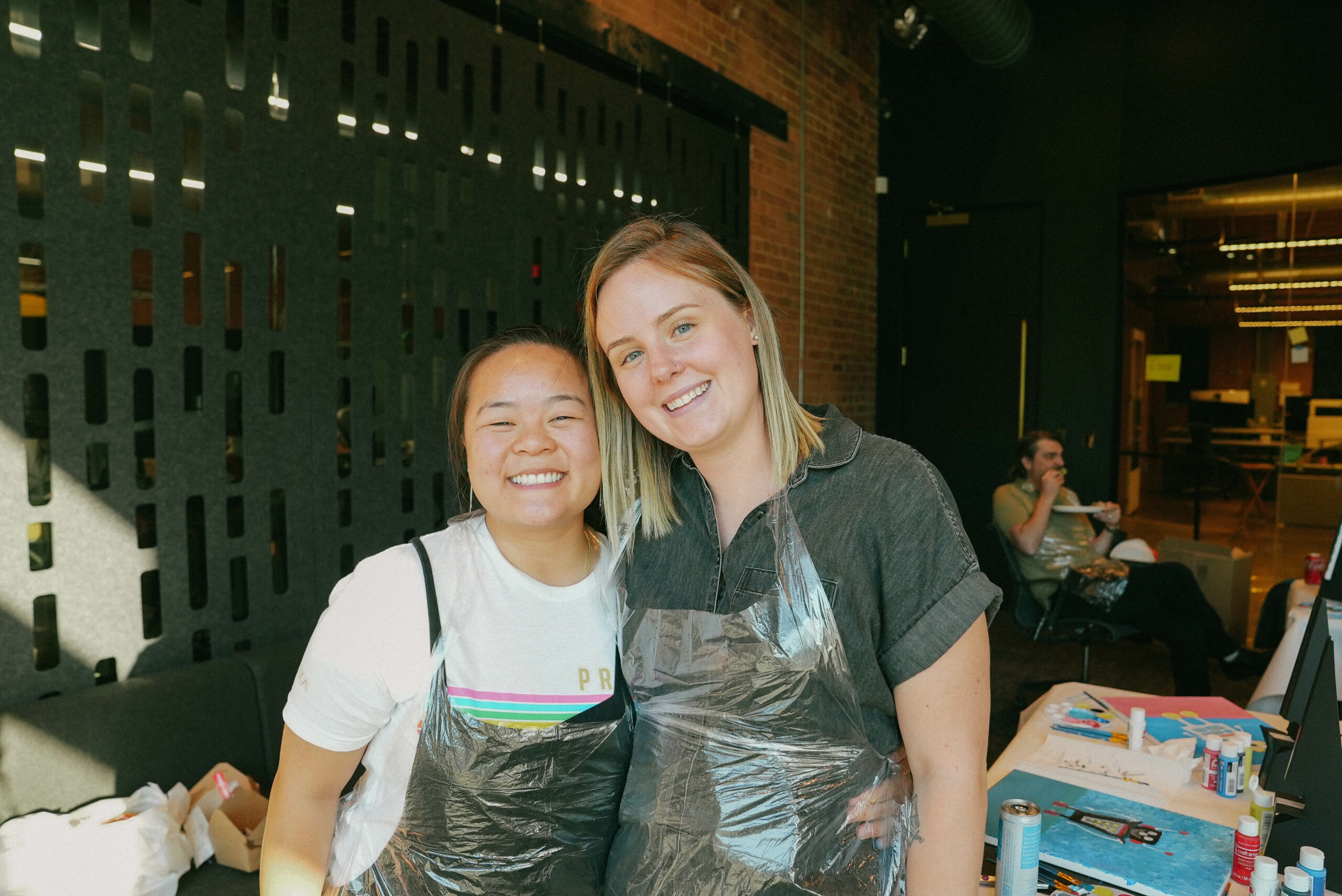Read time: 7 minutes
Last February, I received a message on LinkedIn from a budding designer who requested thirty minutes of my time so that she could ask me about my design experience. Just two weeks later, I received the same request from a second designer.
Up until then, I was certain with every fiber of my being that I was uninterested in design management, and responding to these requests felt very much like dipping my toes into that. The only reason I had agreed to not one but two requests for my time was because I had done the same to a handful of people a few months prior, and those folks ultimately became my colleagues at Dialexa. I had experienced firsthand how thirty minutes could change the trajectory of someone’s career.
So, I agreed.
My only request to Chidi and Aria was to come prepared with a list of questions because, more than anything, I wanted to make sure that they didn’t feel like our time together was spent in vain. I met with each of them separately and learned more about their background, gaps in experience, and goals. It was through these introductory conversations that I learned that we were connected in more ways than one; Aria was an Asian American who had immigrated from Vietnam a few years prior and Chidi was in the middle of acquiring her Master’s Degree from San Jose State University, a school that sits ten minutes from where I grew up. Immediately, I felt tied to these two young women and found myself naturally asking the following question at the end of our thirty minutes together:
“Are you interested in meeting on a regular basis and having more of a mentor/mentee relationship?”
Whether we met weekly or biweekly I didn’t care, but I definitely felt invested in their career after just half an hour together and wanted to continue helping where I could. So, for the next year and some months we met and they asked me questions about how to gain more design experience; how to build their portfolio and resume; how to handle difficult situations at their job (at the time); and, my personal favorite topic, how to interview. Unsurprisingly, I didn’t have an answer to every single one of their questions but I did make an effort to read up on what I didn’t know, pull an appropriate amount of information from my own experiences, and give as well-rounded and well-informed of an answer as I could.
In late July, just four months after we began our mentor-mentee relationship, I received an email from Aria with news that she had received an offer to work as a UX Designer for a San Francisco-based startup that gave her the ability to work remotely. I was over the moon for her and felt honored that I was one of the first people she told.
As for Chidi, I had the opportunity to throw her name into the bucket for a mentorship program sponsored by my company called Dialexa EDU. The premise is that you’re added to a university team and, over the course of two months, have the opportunity to learn more about research, design, and development in a “real world” setting.* Chidi told me that EDU provided her with more of the experience she needed, and about a month after the mentorship program wrapped she had signed an offer for a full-time role as a UX Researcher.

There is something uniquely rewarding about providing guidance to people who ask for it, seeing them run with the things you say and making adjustments where they see fit, and having them come back to share their successes and lessons learned. For a long time I was wary of offering mentorship because I didn’t think I had anything worth sharing, but Chidi and Aria have proven to me that I’m more than capable of, and maybe even good at, being a design manager. By no means am I claiming their success as mine; they got these jobs all on their own. But, playing a part in someone’s career trajectory is not a responsibility I take lightly, and I am grateful to these two for allowing me to take part in theirs, no matter how small.
Best of all, even though they now have jobs in their desired discipline, that doesn’t mean that our mentor-mentee relationship has to end. I still try to meet with them occasionally and it no longer has to be remote because they both now live in Dallas and we can actually grab coffee or a meal! Saying yes to their requests for thirty minutes of my time has changed my life and stretched me in more ways than one, and I encourage anyone who is as unsure as I was about design management to say yes to any opportunities that allow you to learn more about your leadership style. Through this experience with Aria, Chidi, and Dialexa EDU, I have learned so much about the kind of leader I am shaping up to be and I am really proud of that person.
About a year and six months after taking on my very first mentee, I received news that I was going to have my first direct report! Audrey started in late August and it has been a fruitful learning experience for the both of us. I will say that I think I lucked out because she’s an incredibly curious, organized, and enthusiastic team player who manages up well. Additionally, she is constantly requesting feedback from our team members so it makes discussing opportunities of improvement feel really organic. I know managing won’t always be this easy, but I am grateful for this first experience with Audrey.

After nearly two years of mentorship outside of work and just four months of officially having a direct report, I can confidently say that I thoroughly enjoy management. This sentiment also applies to the two designers who are currently on the account I’m leading and whose work I’m overseeing. All of them have wildly different personalities, strengths, and goals, and it's been a lot of fun navigating said personalities and fostering more meaningful relationships with each of them; all of this makes my day-to-day feel so much more fulfilling.
If design management is something you are interested in but are still on the fence about, here are some things I recommend doing to pave the path forward:
- Assess whether or not you have opportunities to mentor others, even if it’s unrelated to your career and more geared towards your hobbies and passions. If you don’t, create said opportunities by talking about the things you know a lot about and offering to teach them to others.
- Set expectations with your new mentee(s) and recognize that the relationship can be as casual or as serious as you both would like it to be.
- Come into the relationship with the intention of just being their friend. We spend most of our time at work, so it would be helpful for them to enjoy working with you. They’ll also be more inclined to share wins and frustrations with you if they trust you, which will make helping them grow much easier.
- Make a concerted effort to learn more about their strengths and the ways in which they want to grow. You are their advocate and, as I mentioned earlier, a person they have entrusted with their career.
- Do your due diligence to not only do regular check-ins about their work or life, but educate yourself on what it may look like to be a great manager; you can find more resources below.
- Rinse and repeat.
This short list is not an end-all-be-all guide, but I offer it as a starting point for dipping your toes into management. I know that I’ve learned a lot about myself since February 2021 (both personally and professionally) and am so glad I said “Yes” to meeting with Aria and Chidi nearly two years ago. Doing so has not only benefitted me, but it helped three other incredible designers and researchers I wouldn’t have had the chance to meet otherwise.
Resources
- The Making of a Manager by Julie Zhuo
- What Makes a Great Design Manager by Jeff Smith
- Peak Performance by Brad Stulberg and Steve Magness
Notes
*You can read more about Dialexa EDU here.
I would like to thank Gabi Geller, Jennifer Xu, and Audrey Bazyk for proofreading this for me. I am grateful for their time and extra sets of eyes ❤️
No comments.